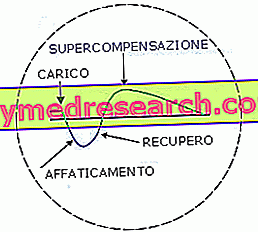Supercompensation
Supercompensation is a theoretical model that explains the process of adaptation of the organism to a specific training stimulus. This concept is based on the state of dynamic equilibrium, called homeostasis, which regulates all the activities of our body. Any condition that disturbs this balance is immediately compensated, as far as possible, by an equal and opposite reaction, aimed at bringing the system back into balance.
The process of fatigue and deterioration induced by physical exercise is thus compensated by a series of reactions, designed to increase anabolic regenerative processes. These reactions can be interpreted as a defense system of the organism that, through them, tries to reconstruct the lost balance.
Supercompensation is the physiological response to the breakdown of homeostasis by the training stimulus
In order not to succumb to the recurrence of a load of the same intensity, the organism thus triggers a process of supercompensation, which aims to improve the original performance level. The metabolic reserves, the metabolism and the various stressed anatomical structures, do not therefore return to the initial state but, for a short time, exceed it, placing themselves at a slightly higher value.

The whole concept of supercompensation is based on this capacity (the body's adaptation process to progressively increasing workloads).
For supercompensation to take place, it is necessary that the training stimulus respects some fundamental characteristics. First of all, the physical effort must reach or exceed a threshold, in order to induce an important physical stress. If the applied load were too weak, the supercompensation process would not take place.
Only the stimuli of volume, intensity and frequency appropriate to the subject's physical capacities stimulate supercompensation or adaptation.
To exploit this characteristic, physical exercise must take into consideration various parameters, such as: intensity, duration, density, volume and frequency of the stimulus, objectives, methods, contents and means of training. These elements characterize the EXTERNAL (objective) load, but there is also an INTERNAL load, which varies from person to person, which represents the type of effects that the exercise induces on a specific organism (importance of continuous monitoring through the training diary).
Importance of recovery
If the training load is excessive and is not compensated by an adequate recovery period, a dangerous state of overtraining is created, with a decline or stagnation in performance.

The temporal constants for the recovery of the normal and graphical functions of the supercompensation phases (Findeisen et al. 1976).
Supercompensation and training »
An extra gear, supercompensation »



